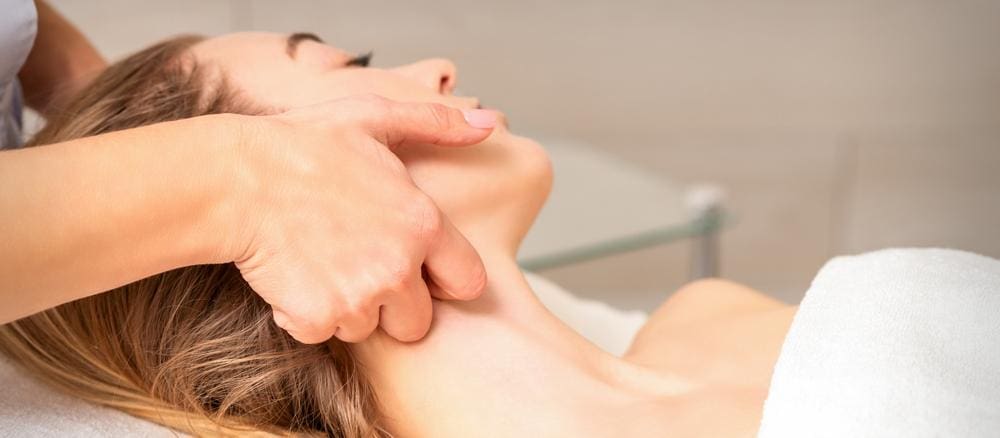
Have questions about chiropractic care for 5th trigeminal nerve pain? Here’s what you need to know.
Trigeminal neuralgia, also called tic douloureux, is a chronic pain disorder affecting the trigeminal nerve. This nerve is one of the largest nerves in the human body and transmits sensation from your face to your brain. In trigeminal neuralgia patients, the usually reliable pathway becomes hypersensitive, and the pain response goes haywire.
The intensity and duration of the pain vary from patient to patient. Some people may experience a few very brief attacks, while others may have hours-long periods of pain several times per day.
The symptoms of trigeminal neuralgia can vary depending on the specific type of this condition, but some general signs and symptoms to be aware of include:
The exact cause of trigeminal neuralgia is unknown, but many factors can increase your risk. It can be caused by anything that causes swelling or inflammation in the area around the trigeminal nerve, including trauma, tumors, and infections.
You have a high chance of developing trigeminal neuralgia if you have multiple sclerosis (MS) or a related disorder known as immune-mediated demyelinating disease (IMDD).
Other factors that may increase your risk include:
Several different things might trigger trigeminal neuralgia, including:
Yes. A brain cyst in the cistern area near the trigeminal nerve can cause trigeminal neuralgia. Several factors, including an infection or head trauma, can cause a brain cyst.

Neck misalignment is a condition that affects the vertebrae of the neck, causing pain and discomfort in this area. While some research has linked neck misalignment to other medical conditions such as headaches, back pain, and more, there is much less evidence suggesting that it can also contribute to trigeminal neuralgia.
However, experts agree that neck misalignment can exacerbate symptoms of trigeminal neuralgia.
Yes. Symptoms of neck pain due to trigeminal neuralgia vary depending on the individual. It may be a sharp, sudden pain in one area of the neck or associated with numbness or tingling. If left untreated, trigeminal neuralgia can cause chronic pain that is difficult to manage.
You can stretch the trigeminal nerve by applying pressure to different points along its path, including:
Applying pressure to any of these areas can help stretch the trigeminal nerve, relieve pain, and reduce tingling or numbness in your face.
Trigeminal neuralgia is usually diagnosed through clinical tests and imaging scans.

For example, your doctor will likely do a physical exam to identify the areas of your face most sensitive to touch or heat and any other possible causes of your pain. They may also recommend an MRI or CT scan to take a closer look at the structure of your brain and nerve pathways.
There is no definitive test for trigeminal neuralgia. Still, these tests can help your doctor get a complete picture of your condition and help them develop a treatment plan best suited to your individual needs.
Some common treatment options for trigeminal neuralgia include:
Depending on the severity of your symptoms and the underlying cause of your trigeminal neuralgia, your doctor may recommend one or a combination of these treatments.
Trigeminal nerve pain is often treated with medications that can alleviate inflammation in the area where the pain occurs. These may include non-steroidal anti-inflammatory drugs (NSAIDs) or corticosteroids. For more severe and persistent pain, your doctor may prescribe medications such as anticonvulsants and antidepressants.
Surgery may be recommended if the medication does not effectively control your trigeminal neuralgia symptoms.
In addition to medications and surgery, you can make several lifestyle changes that can help reduce trigeminal nerve pain. These may include avoiding triggers that cause pain, such as bright lights or sudden movement. Additionally, some people find trigeminal neuralgia relief from practicing relaxation techniques like deep breathing and meditation.
Yes. Massage therapy is often used to help treat conditions and ailments, including trigeminal neuralgia. Massage therapy for trigeminal neuralgia reduces inflammation in the affected area, helping to calm the nervous system and improve circulation.
Sometimes. In many cases, trigeminal neuralgia can be treated with medications or alternative treatment options such as acupuncture, chiropractic treatment, nerve stimulation, or physical therapy.
Yes. Spinal manipulation may help relieve symptoms in some patients, and experts believe spinal misalignments may irritate nerves and contribute to the condition.

Yes. Chiropractic care can be an effective treatment option for facial pain. It is a non-invasive approach aiming to improve the musculoskeletal system's function.
Yes, a chiropractor can help trapped trigeminal nerves and other causes of facial pain. Facial pain generally refers to any pain in the face, and it may manifest as facial tingling or numbness, headaches, jaw pain, and more. Chiropractors are trained to help treat patients with these types of pain by addressing underlying physical causes, such as trigeminal neuralgia or muscles that are out of balance.
Trigeminal neuralgia is a very rare and serious condition, affecting only a small part of the population. It occurs when there is damage to or dysfunction in one of the branches of the trigeminal nerve, which provides sensation to your face and mouth. This nerve damage can result from physical trauma to the face, as with a car accident or a sports injury, or an underlying problem with the nerve itself may cause it. The cause of trigeminal neuralgia is typically unknown and often difficult to diagnose.

© Accident Care Chiropractic | Hablamos Español
Located in: North Portland, NE Portland, SE Portland, Gresham, Clackamas, Oregon City, Hillsboro, Bethany, Beaverton, Tigard, Forest Grove, Woodburn,
McMinnville, Keizer, Salem, South Salem, Bend, Springfield, Vancouver, Hazel Dell, East Vancouver, Pasco, Kennewick, Lakewood.
We Specialize in Car Accident Treatment & Recovery
Home | About Us | Testimonials | Blog | Sitemap | Privacy Policy | Services | Locations | Contact Us